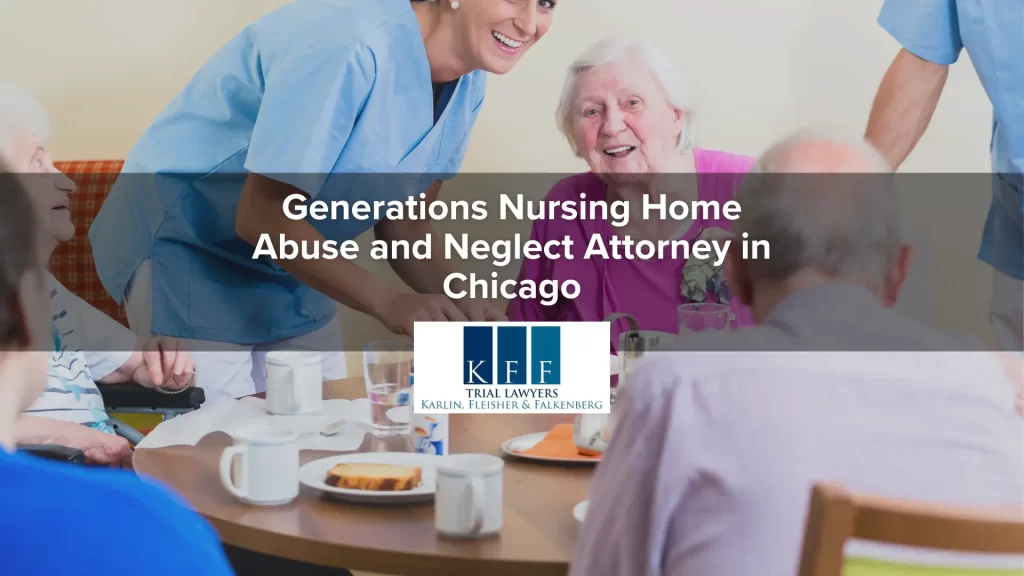
An internet search for nursing homes in the Chicago area turns up beautifully designed web pages with pictures of smiling elderly residents and kind-looking healthcare staff. It can also turn up one-star reviews and warnings from others to stay away. It can be hard to sort through what is fact and what is fiction. Generations Nursing Home and similar nursing home communities tout themselves as safe, supportive healthcare facilities that offer residents all the luxuries of home, including comfort and quality care. What happens when you begin to suspect that your loved one is not receiving the quality healthcare that was promised, and may actually be suffering at the hands of their caregivers or fellow residents?
At Karlin, Fleisher & Falkenberg, LLC, we are serious about investigating claims of abuse, neglect, or mistreatment of the elderly at Generations Nursing Home facilities. We understand that it may be difficult, if not impossible, for some elderly family members to come forward with their experiences of abuse. If you see potential signs of abuse or neglect, however, you have options.
The legal team at Karlin, Fleisher & Falkenberg, LLC has both the experience and the resources it takes to thoroughly investigate allegations of abuse. If you suspect some form of abuse may be taking place, please reach out to us at 312-346-8620 for a consultation with a seasoned attorney.
What Is the Definition of Nursing Home Abuse?
At its core, nursing home abuse is defined as an individual with power or authority over an elderly adult intentionally inflicting harm or putting that person in jeopardy. In a nursing home setting, the individual with power or authority tends to be a nurse or caregiver. While the definition may seem straightforward, it is intentionally a bit vague. That is because “intentionally inflicting harm” can refer to many different things.
Abuse isn’t always about hitting or being physical with a resident. Inflicting harm can come in a wide variety of forms, from physical harm to emotional or psychological harm. In fact, data from the World Health Organization shows that physical abuse in nursing homes is not the most prevalent form of abuse.
What Are the Different Forms of Abuse?
There are several different forms that abuse can take place. While the physical signs of abuse can be more easily identified, all forms of abuse can take a serious toll on the health of an elderly nursing home resident. Studies have found that the risk of death for elderly individuals increases significantly when they are exposed to any form of abuse.
In fact, the National Council on Aging suggests that elderly residents who have suffered abuse are at a 300 percent higher risk of death than those who have never suffered from abuse. Abuse can take several different forms.
These are the most common types of nursing home abuse:
- Physical abuse: This is the act of inflicting physical harm or pain on an elderly resident or adult. Physical abuse can lead to broken bones, unusual bruises or bleeding, marks or cuts, and other physical signs of injury.
- Emotional abuse: This type of abuse can take the form of yelling, insulting, humiliating, berating, isolating, or otherwise inflicting mental anguish or torment on an elderly resident. Changes in mood, eating, and sleeping patterns may be signs that a loved one is being emotionally abused.
- Financial abuse: Financial abuse occurs when a caregiver, staff member, or other resident steals, swindles, or manipulates money from an elderly individual. This type of abuse can include stealing personal property from a resident, gaining access to their bank account, forging checks, even manipulating them into a scam or bogus investment opportunity.
- Sexual abuse: Sexual abuse is one of the least reported forms of abuse in nursing homes. Not only is there still a stigma surrounding sexual abuse, but predators also tend to choose victims who can’t communicate that abuse is happening or won’t be believed because of cognitive conditions. Sexual abuse is rape, fondling, unwanted touching, viewing of inappropriate materials, or the taking or distributing of sexual pictures or videos.
Is Neglect Considered Abuse?
 In a word, yes. Neglect can be seen as a form of abuse. It is not a simple act of making a mistake. Neglect is the systematic failure of a caregiver to address the basic needs of an elderly resident. It is a pattern that leads to long-term suffering and serious injuries and medical complications for residents on the receiving end.
In a word, yes. Neglect can be seen as a form of abuse. It is not a simple act of making a mistake. Neglect is the systematic failure of a caregiver to address the basic needs of an elderly resident. It is a pattern that leads to long-term suffering and serious injuries and medical complications for residents on the receiving end.
A scientific study conducted in 2011 found that at least 21 percent of nursing home residents had been neglected at some point over a 12 month period of time. There are even subcategories of neglect, including:
- Medical neglect: The failure of a caregiver to provide to a resident’s medical needs or condition.
- Basic needs neglect: Failing to attend to the basic human needs of a resident, including failing to provide adequate food, water, and a clean environment free from safety hazards or harm.
- Hygiene neglect: Not properly providing or helping a resident with basic hygiene, including laundry services, bathing, and dental care.
- Social neglect: This type of neglect can include isolating a resident from others or not providing them with social or emotional care.
Signs of neglect may include bedsores, unchanged linens, poor hygiene, malnutrition, dehydration, and changes in mood or appearance.
How Can Karlin, Fleisher & Falkenberg, LLC Help My Family?
Caregivers hold an enormous amount of power over the residents they abuse, so much so that residents may fear coming forward because of retaliation. It is up to you to speak up for an abused family member and stop their nightmare from continuing. If you have suspicions that a loved one may be suffering from abuse while in a Generations Nursing Home facility, you don’t have to face the emotional and complex situation on your own.
Contact the legal team at Karlin, Fleisher & Falkenberg, LLC now. We will listen to your concerns, take your suspicions seriously, and conduct an investigation to get to the bottom of what is going on behind closed doors.
Call us today at 312-346-8620 to set up a consultation with an experienced nursing home abuse attorney. Give your loved one their life back.
